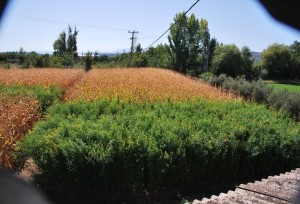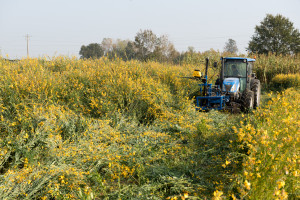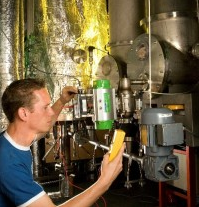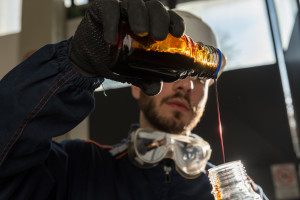The deployment of sustainable bioenergy is urgently needed to reach our climate targets, as set out in the Paris Agreement. Advanced biofuels produced from non-food biomass, such as wood, straw, and lignocellulosic energy crops, are a key solution to decarbonize transport, especially in those sectors where alternative renewable fuels are not available yet, such as aviation, shipping, and long-haul transport. Since large volumes of biomass will be required to achieve this objective, how can we produce it sustainably, while preserving our environment and not reducing the agricultural lands required for food?
BECOOL is a Horizon 2020 project that will foster the development of advanced biofuels from sustainable agricultural value chains, based on lignocellulosic biomass. Launched in June 2017, the 4-year project is coordinated by the University of Bologna, Department of Agricultural Sciences, and is carried out by a consortium of thirteen partners from seven EU countries, including universities, research institutes, industries and SMEs. The project is based upon three pillars covering the whole value-chain: from the production and harvesting of non-food crops and crop residues (1), to the efficient logistic of feedstocks (2), and their conversion into a range of products, for transport, including aviation (3). The division of tasks within the consortium is well balanced in the main parts of the value chain.
Four partners (UNIBO, CRES, CIEMAT and CREA) address lignocellulosic feedstock production and harvesting. Five partners work on thermochemical and biochemical conversion processes (BTG, Biochemtex, ECN, VTT and RECORD). Three partners develop logistic concepts and integrated assessment of selected whole value chains (Wageningen UR, DBFZ and IIASA). Finally, ETA-Florence and the University of Bologna take care of dissemination, communication, exploitation and data management activities.
Innovative cropping systems and feedstock diversification
A fundamental component of BECOOL is the development of integrated biomass supply systems, encompassing annual crops and perennial dedicated lignocellulosic crops, together with crop residues such as straw, and lignin-rich and bagasse residues from bioethanol production. On the agricultural side, BECOOL partners are working since the beginning of the project to test and to demonstrate integrated cropping systems, based on a rotation of annual lignocellulosic crops with conventional food crops, and intercropping. In this way, land competition between food and biofuel crops will be substantially mitigated, while land cover and land use increased.
Since 2017, experimental field trials were established in Greece, Italy and Spain with fiber sorghum, sunn hemp, kenaf and hemp grown in rotation with conventional food crops. The growth and yield parameters of both lignocellulosic crops and traditional food crops are being monitored constantly. Preliminary results from the first year are very encouraging, especially the rotational trials of sunn hemp grown as summer catch crop after maize in Greece and in Spain, and after wheat in Italy. In addition to annual crops, perennial grasses grown on marginal and idle lands will complement the lignocellulosic feedstock. In this case, the project is focusing on the cultivation of giant reed, miscanthus and switchgrass, and eucalyptus.

in Greece in Sept. 2017. Source CRES.

Efficient biomass harvesting and logistics
Biomass logistics is another important element to ensure a viable production of advanced biofuels at large scale. Currently, lignocellulosic biomass for advanced biofuels plants consists mostly of crop residues (such as cereal straw), whose availability for the industrial plant is uncertain, as it can vary depending on factors such as the local annual productivity of cereal crops, and the demand for straw for competing usages (bedding, mulching etc.). In BECOOL, novel biomass logistic concepts such as biomass yards/hubs, intermediate collection points, centralized and decentral pre-treatment steps etc., will be evaluated using available logistic tools (ex. LocaGIStics, Bioloco and BeWhere). Afterwards, they will be applied to different conditions, to provide cost-effective logistic and to adapt the supply of biomass from a range of diverse feedstocks to the requirements of standardized industrial conversion processes. The optimization of mechanical solutions to increase the efficiency of recovery of agricultural residues (chaff, maize cob, prunings) lignocellulosic crops and plantations, is another task carried out by the project: harvesting trials and demonstrations are therefore planned for this summer.
Optimizing process efficiency

Another pillar of the project is the efficiency and the feedstock flexibility of the current thermochemical and biochemical conversion processes. Gasification trials have been conducted already with different biomass feedstocks (fibre sorghum, giant reed, eucalyptus, and others), by determining the viability of each feedstock and the optimal process conditions to produce a gas suitable for further upgrading into biofuels. In addition, gasification trials of fast-pyrolysis oil obtained from the same types of biomass will also be performed. The use of FPO instead of solid biomass for gasification would have the advantage of making the gasification process easier, thanks to its liquid form and its low ash content.
Another research activity of the project will focus on improving the overall efficiency of lignocellulosic ethanol production, particularly by developing solutions for the valorization of the lignin-rich residue derived from lignocellulosic ethanol production. The residue will be used to produce additional heat, power, and lignin oil from fast pyrolysis. Lignin is the interface between the biochemical and the thermochemical platforms, and the oil could be a promising intermediate energy carrier for further upgrading into additional advanced biofuels.
Integrated sustainability assessment

Besides experimental research, another objective of the project is to perform an integrated sustainability and market assessment of the different value chains. The study will quantify the environmental and socio-economic impacts of the value chains and will identify the most promising ones under current and future market conditions. The assessment approach envisaged is based on comprehensive data from work packages dealing with cultivation, harvesting, logistics and processing of biomass. Thus, a coordinated approach for the collection of a consistent and harmonised database is necessary and this was the scope of a technical workshop held in Athens last January, where partners from all work packages gathered, to provide data and to compile feasible value chains of giant reed, eucalyptus, fibre sorghum and lignin-rich residue. The workshop was very successful in understanding the cross-cutting issues across different disciplines and in providing a clear picture of all the steps involved in the specific value chains.
Brazil-EU cooperation
The activities of BECOOL are aligned with those of BioVALUE, a twin project in Brazil, funded by several State Foundations and Brazilian industrial companies. The project consortium also includes research institutions and university partners, coordinated by the Brazilian Bioethanol Science and Technology Laboratory (CTBE), of the Brazilian Center for Research in Energy and Materials (CNPEM). Building on the existing complementarities in scientific expertise and experience between EU and Brazil in the development of advanced biofuels, the two projects will adopt a synergistic work programme to develop a series of research and demonstration activities, covering the entire value chain in a balanced way. The cooperation between Europe and
Brazil on advanced biofuels will bring mutual benefits and will create synergies at a scientific level. This will help exploit the full economic potential of advanced biofuel value chains while creating unique opportunities for both Brazilian and European companies.
 BECOOL (Brazil-EU Cooperation for Development of Advanced Lignocellulosic Biofuels) has received funding from the European Union’s Horizon 2020 Programme under Grant Agreement 744821.
BECOOL (Brazil-EU Cooperation for Development of Advanced Lignocellulosic Biofuels) has received funding from the European Union’s Horizon 2020 Programme under Grant Agreement 744821.
The partners of the BECOOL consortium are: University of Bologna (Italy, coordinator); Biochemtex s.p.a. (Italy); Biomass Technology Group (The Netherlands); Centro de Investigaciones Energéticas, Medioambientales y Tecnológicas (Spain); Centre for Renewable Energy Sources and Saving (Greece); Consiglio per la Ricerca in Agricoltura e l’Analisi dell’Economia Agraria (Italy); Deutsches Biomasseforschungszentrum Gemeinnuetzige GmbH – DBFZ (Germany); Energy Research Centre of the Netherlands (The Netherlands); ETA-Florence Renewable Energies (Italy); International Institute for Applied Systems Analysis (Austria), Consorzio per la Ricerca e la Dimostrazione sulle Energie Rinnovabili (Italy); Wageningen University & Research (The Netherlands); Teknologian tutkimuskeskus VTT Oy (Finland).
Visit www.becoolproject.eu and watch our videos to learn more about the project activities.
This article is by Maurizio Cocchi, ETA-Florence Renewable Energies, and Andrea Monti, University of Bologna.


